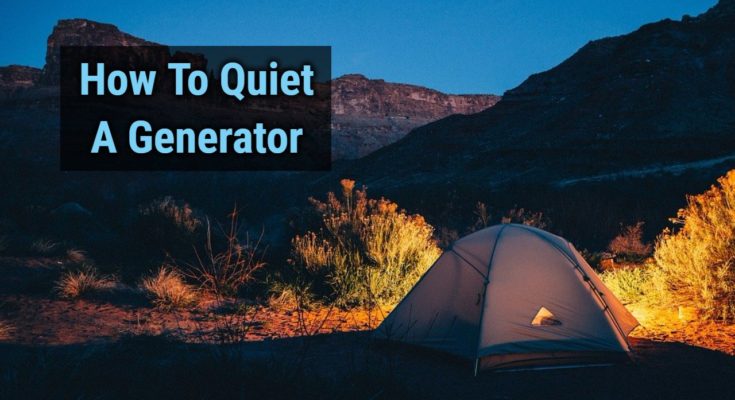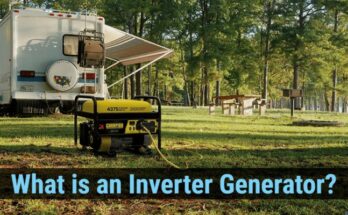In this fast-paced world, you can’t afford to be disconnected from your work. If you are working from home, then power outages will result in downtime that you surely don’t want. The solution to this problem is a generator.
A generator is an important part of life, and you can bring it along for a camping trip or power appliances of your RV. It can be really handy in some emergencies. There are different types of generators you can have to fulfill your power needs. It can be a portable generator or standby generator.
The one trouble that any of them will give is their noise level. They are noisy equipment, some will be less, and some will be more. The noise level can range from 55 dB to 100 dB.
The main reason for a generator’s noise is their engines, coiling fans, mechanical noise due to trembling, and few others. If the noise is more, then it can get very annoying. But to reduce the noise, you can take certain measures. All the things that you can do to reduce the noise of a generator are described below. But first,
Table of Contents
Why are Generators so Loud?
A generator is a piece of inherently loud equipment, and this is because they use combustion engines to generate power. As the generator starts working, small and loud explosions of fuel start taking place inside the piston cylinder. The engines are well insulated, but the noise makes its way out through an exhaust pipe. And that’s why the two loudest parts of the generator are its engine and the exhaust pipe.
Besides that, there are four other sources of noise. It is cooling fan noise, alternator noise, induction noise, and mechanical noise. The mechanical noise will be generated due to the vibration of the engine.
When a generator is working, the motor gets overheated. To remove the heat, the generator can either have liquid cooling or air cooling. Liquid cooling is more effective than air cooling, but it is expensive to have and maintain.
On the other hand, air cooling is cheaper, and the air is circulated by fans. Those fans make the noise. Another source of noise for a generator can be its muffler, and if it is not functioning properly, then the noise will increase significantly.
Also, the noise will depend on the type of generator you have. The standby generators are bigger in size and produce more power, and it makes their engine louder compared to the small portable generators who produce less power.
The noise level of the generator can range from 50 dB to as high as 100 dB. A general range under which most of the generator falls is 50 to 90 dB.
The noise level will also depend on the position of the generator; place it closer, and you will hear more noise.
Why Should You Silence Your Generator?
Generators are essential, and they make the loud annoying noise; these two are facts. The noise of the generator needs to be muffled. If someone is exposed to a noise level of more than 85 dB, then they will start getting permanent hearing damage. And that is not a good trade to get a few watts of electricity.
Noisy generators are also bigger, and bigger generators are typically used to power the house. This will also expose your family members to the noise. If it is not winter, then you can place the generator further away to reduce the noise.
But it may create disturbance to your neighbors. And if it is winter and snowing, you will have to place the generator near the house or in the garage; this increases the noise level quite significantly.
To reduce the noise, we have described many measures that you can take. If you employ any of the measures, then the understanding that you are doing something to reduce the noise with your neighbor will earn you respect.
The silencing is not done to improve the performance or reduce the operating cost or something like that; silencing of the generator is necessary for you and your family to have peaceful and healthy days.
How to Reduce the Noise of a Generator?
Change the Direction of Exhaust Pipes
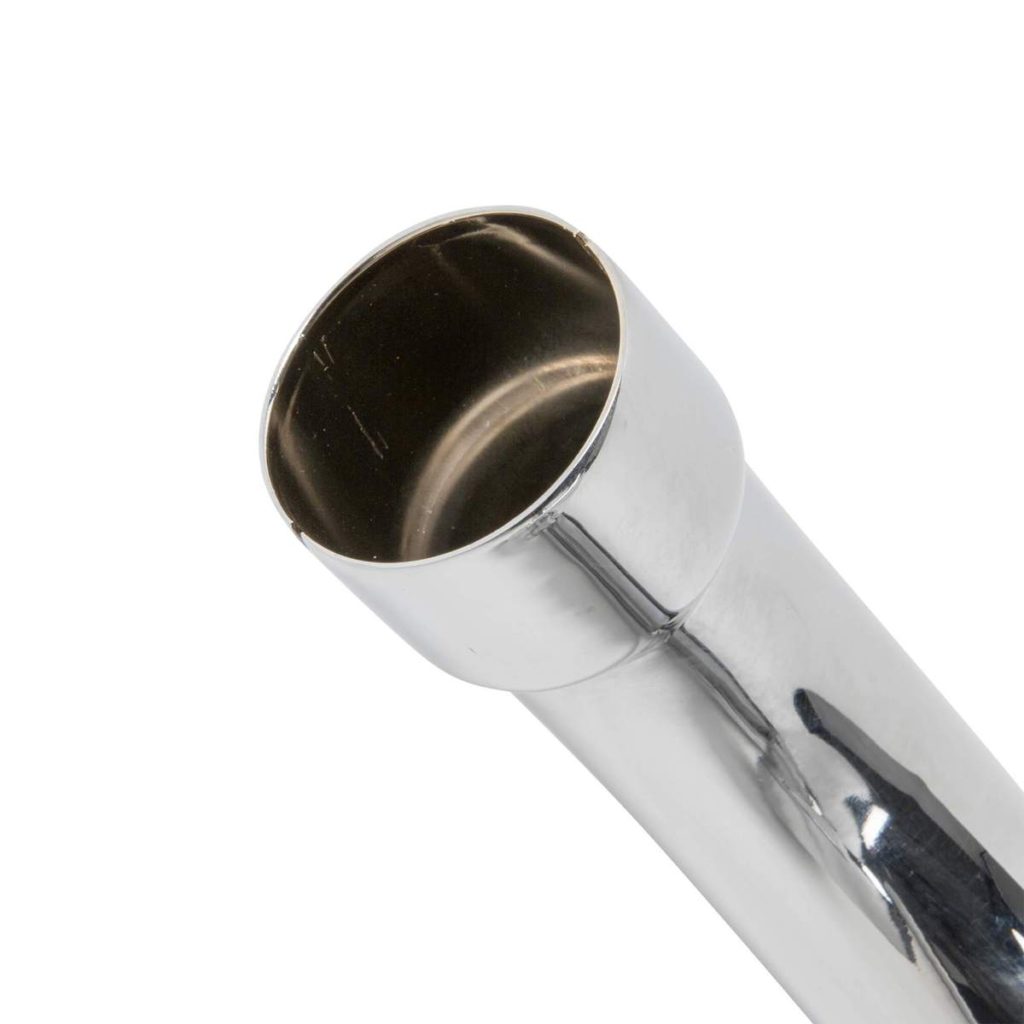
Significant noise is emitted out from the exhaust pipes of the generator, and changing their position will introduce a considerable noise reduction. You should always keep the exhaust pipes in the opposite direction of yours.
Many of the generators in the market offer the flexibility to change the exhaust position in an upward direction. It reduces the noise further compared to when it is set in the horizontal direction. This is because the noise will equally be dispersed in all directions, so the intensity of it gets reduced.
Build Enclosures for The Generator
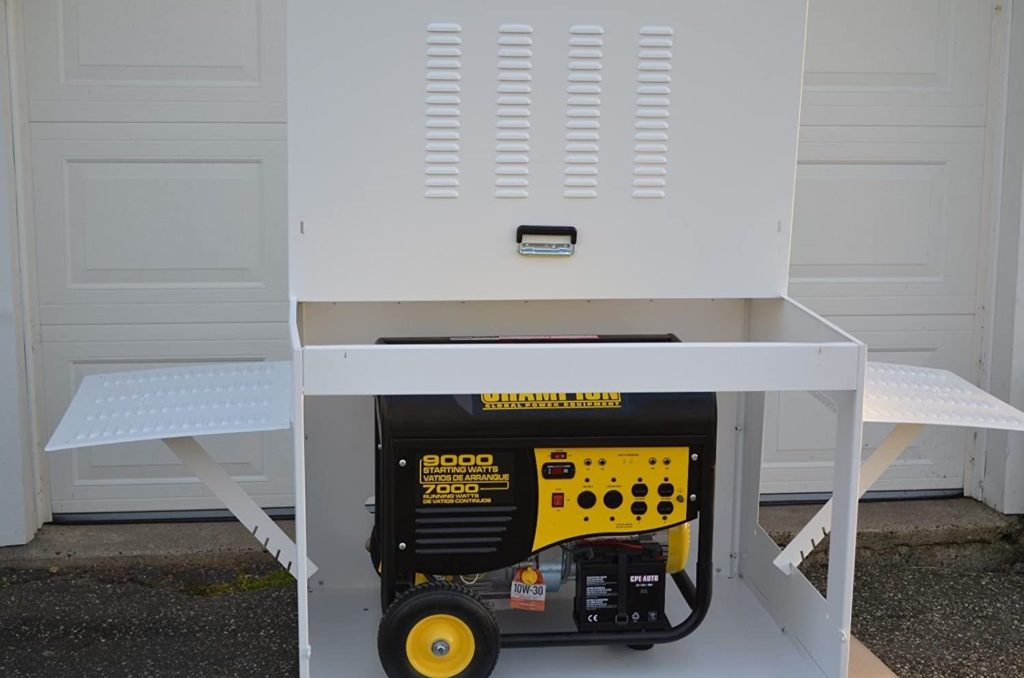
The best thing to do to reduce noise is to keep it in a box, the acoustic box, which contains the generator and muffles the sound more effectively. It is an effective solution and lowers the noise to a great extent.
You can buy the one from the market or build one yourself. It is a simple thing to build, the enclosed box. Measure the dimension of the generator and make walls out of the concrete if you don’t move your generator and always keep it at one decided place. Also, you can build the one out of the woods.
The important thing to keep in mind when building the enclosed is to keep the space for the air to enter for cooling purposes. The accumulated heat can damage the generator in many ways.
Moreover, you will have to make sure that the exhaust gets properly outside the box. A fireproof material is suggested to build the enclosure because it will absorb the heat better and also keep the sound level low.
Keep the Generator Further Away
Another important consideration to reduce the noise of a generator is to keep it away. If you are on a camping site, the increased distance will significantly reduce the noise. Almost every generator manufacturer mentions the noise level that a particular generator is going to make.
They measure the sound level from a distance of 23 feet or 7 meters. So, the generator, which boasts a low noise level of 50 decibels, will be much louder when you keep it closer to you. You should keep it at least 20 feet away from your site.
Also, the distance up to which you can place your generator depends on many factors. It depends on where you are camping and how long an extension cord you have. If you are camping at any campsite, then the space available to you will be limited because there will be neighbors alongside you.
So, you will have to place the generator in such a way that you have the lowest noise level possible while also not keeping too close to your neighbor’s place.
If you are in an open ground where no one is around you, then you can keep it as far away as you can. This distance will be limited by the length of your extension cord, so it will be good to invest in a long extension cord. It will provide the more quiet environment at your camping spot.
Use of Sound Deflectors

This is a very simple method to reduce the noise of the generator without affecting the performance or inflicting any harm on it. It is a temporary solution that can reduce the noise to a certain extent.
The sound deflectors don’t make any changes in the generator, and they just block the noise coming out of it from reaching you.
To deflect the noise, you don’t need much of anything, just 4 plywood sheets and one drywall sheet, which is non-flammable. You can get these things in the market, and they are inexpensive. the dimensions of the materials should be based on how big a generator you have.
Once you have them, lean them on the generator at specific angles. On the exhaust side, use the drywall because you might not like it if one of the plywood catches fire.
They will let enough air pass and deflect the sound coming out of the generator to the ground.
Replacing the Mufflers
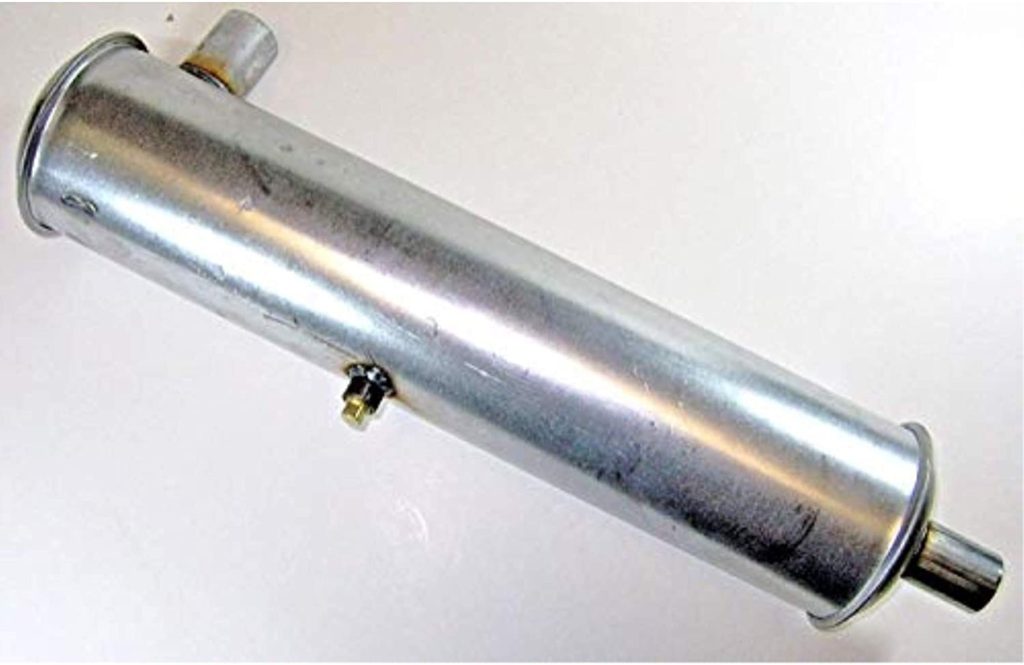
The muffler is a device that muffles the noise coming out of the exhaust pipe, and it works the same as it works in any vehicle.
The exhaust pipes are one of the noisiest parts after the engine, and to reduce the noise coming out of it, the well-known method is to replace the muffles that you get with the bigger ones. This can reduce the noise coming out of the generator by 10-12 dB.
The mufflers will have perforated tubes inside of them, which helps them deflect the sound of the exhaust pipes.
Use of Water Bucket as a Muffler
The use of a water bucket to muffle the sound, for someone, may come off as an absurd proposition. This is because water and a generator are two opposite things and should never be brought together.
But, this method is quite effective, and many homeowners use it to reduce the noise of the generator. It can reduce the noise coming out of the exhaust pipe up to 8 dB. To implement this method, you will need only a few things, a 5-gallon water bucket, a hose, and a clamp.
The setup is pretty simple; you just have to connect the hose to the exhaust pipe using a clamp and place the other end of the hose inside the water bucket. The water will muffle the sound coming out of exhaust pipes.
Moreover, always keep the generator above the bucket level. This is to remove the possibility of water backflowing into the pipes. To be more cautious, you can make some holes in the hose, and it should not leak the noise but should be able to release the water out.
Mind the Surface Where You Place the Generator
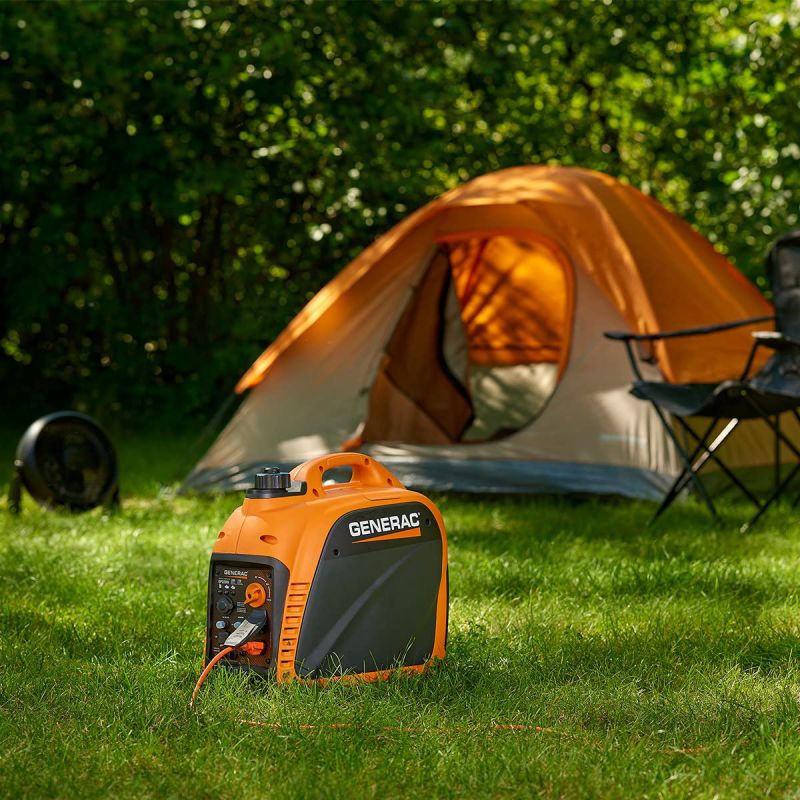
The general place for many homeowners to keep the generator while it’s running is a concrete or wooden block. But those are hard materials, and hard materials amplify the sound. They will increase the noise coming out of the generator. So, avoid locating your generator on hard surfaces like asphalt, metal, wood, or concrete block.
On the other hand, the soft surface will absorb the noise and also the vibrations. If you are camping, then you can put it on the ground or the grass. This will soften the noise. Now, suppose you can’t put your generator on the soil or the grass. If that’s the case, then you can invest in a good quality anti-vibration material padding.
Put it underneath the generator, and it will keep the noise level and vibration in check. Alternatively, you can use it, if you have a fluffy carpet or rug. They will also absorb the noise and vibration.
Invest in The Right and More Quiet Generator
The market is full of different types of generators; some will be more costly than others, some will be more powerful, while some will be quieter than others. You can find the one which is not so noisy and can fulfill your needs.
The generators which are big and produce more power are intended for those applications where the noise won’t be a problem, like a job site. The noise won’t be a problem there because other machinery will be already making much noise.
The generator which is made for home and camping will differ in terms of power. At home, you will need more power compared to camping generators to run many appliances in the house. Whereas, at the camping site, you don’t need that much power.
At home, a generator can be placed outside, away from the house, or in housing, and this will reduce the noise to a good extent.
But for camping, you don’t need this much power, so you can purchase smaller and quieter inverter generators. With this, you won’t have to take any extra measures to reduce the noise. If you can afford it, then you can invest in a more quiet generator for your home too.
Conclusion
Those were the most effective methods that can reduce the noise of the generator by 10 – 15 dB. Please note that no method is going to make your generator completely silent. But this reduction in noise makes a big difference, and your neighbors will definitely appreciate it.
When employing any of the methods, make sure that it doesn’t become a hindrance in the working of the generator.
Also, the generator will need enough air circulation, and this is accompanied by the need to release the exhaust in the open. It will keep you and the generator both safe.
Now, the generator will make considerably less noise, and the silence will prevail.

